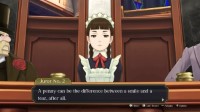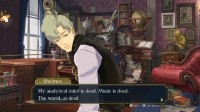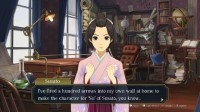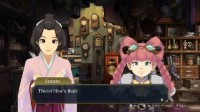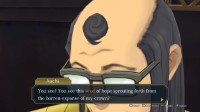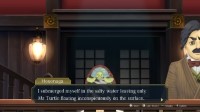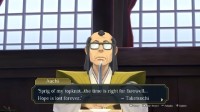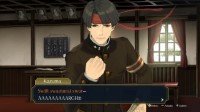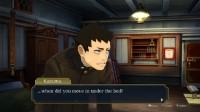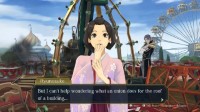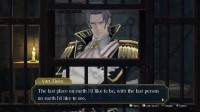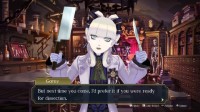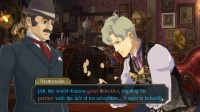Ace Attorney Chronicles
TOTAL PLAYTIME: 60 Hours
Finished 29 August 2023.TGAA1 Playtime: 26.5 Hours
Took a pretty long break after the first case, but the other 4 were played pretty much back-to-back over just a few days. This release apparently has a bunch of achievements and stuff that the other collection (AA1-3) lacked, but I'm not going out of my way to look for them or anything. Obligatory thirsty comment - the maid juror in cases 3 and 5 is cute.
TGAA2 Playtime: 33.5 Hours
The playtime also includes completion of all 8 of the Escapade mini-episodes, each of which probably took between 10-15 minutes. They all technically take place within the timeframe of TGAA1, but I played them after (for fear of spoilers) and didn't closely track the time, so just including in this playtime instead. Basically, it took almost exactly 60 hours to finish the entire collection.
As far as TGAA2 goes, I started this pretty much immediately after completing TGAA1, and completed it just over a week later. Just like TGAA1, extremely slow pace but I really liked the plot. It was incredibly satisfying to see everything fall into place over the course of the last few trials. In terms of the tightness of the plotlines and the balance between goofy and believable characters, I think TGAAC is probably the best overall collection of the series. AA1-3 had some bloat and some stinker cases, AAI 1 & 2 were generally good but the two games felt very disjointed from one another, and I admittedly don't know much about the arc of AA4-6 currently. Thirsty note: Tusspells is pretty cute.
For the most part, this game works in the exact same way as the rest of the series - only this time it's set in a Victorian steampunk London instead of the weird Japanafornia setting in the rest of the series. In this world, Japan has only recently adopted the modern court justice system, so the Japanese government decides to send a student representative to Britain on a "study tour" with the aim of bringing back their knowledge and experience to boost Japan's development. The main character, Ryusuke Naruhodo, isn't actually selected; but similarly to the original AA trilogy, his friend and mentor Kazuma Asogi suddenly dies in transit and Naruhodo decides to takes his place. Asogi's original judicial assistant, Susato Mikotoba, decides to continue the tour with Naruhodo. She's far more serious and capable than Maya, but some of her quirks (such as being a huge fangirl of British culture) nevertheless end up creating a fun dynamic with Naruhodo. The duo meet Herlock Sholmes and his assistant/adopted child Iris along their adventures, who fill in as the investigative partners - though this time, they are a separate "faction", not specifically employed under the prosecutors' office. No paycheck jokes this time! Lastly, they face off against Barok van Zieks as the main rival prosecutor in this game, who kind of looks like a vampire. Despite being called the "Reaper of the Bailey", he's actually one of the more tame prosecutors in the series which I somewhat appreciate, but he has some very prejudiced commentary throughout the game which is kind of funny.
The new "mechanics", if they can truly be called that, hardly affect the flow and feel of the game. The main ones I can think off are the Course Corrections, Summation Examinations, and the Pursue option during testimonies. Course corrections are small-scale puzzles that basically focus in on finding truths in minor conflicts during investigation, for the purpose of extracting obscured information that usually becomes important later. I've noticed that these have mostly replaced the gameplay flow of running around everywhere during investigations to present objects to people; as a result, investigations are a bit more "linear" with less time spent finding and presenting objects around the map. Summation examinations occur at a few scripted times in each of the trials taking place in London when the jury unanimously decides on a guilty verdict - Naruhodo must press and pit the jurors' opinions against one another in order to convince them that there may be a hole in the prosecution's argument. It usually plays out very similarly to a regular testimony though. The last one I can think of, the "Pursue" option, is also the most minor. Sometimes when pressing a statement, one of the other witnesses might suddenly have a reaction (pops up in the UI, so it's tough to miss) - you can switch focus to the other witness and Pursue them to get an explanation for their reaction. Mechanically, this functions identically to a normal Press statement otherwise; there is never a reason not to Pursue. Outside of these listed differences, everything else either functions the same as in other games, or is minor to the point that I do not remember it.
Obviously, the meat of the game lies within the writing of the individual cases and overarching plot across the entire game. As far as the individual cases go, this game is certainly a mixed bag. The first case was drawn out so much longer than necessary (by hours, in fact) that I'd consider it to be one of the worst in the series, full stop. I think it serves as quite a good case study as for why a long trial-only case simply does not work in practice. In drastic constrast, I really liked the second case, which was investigation-only and had a particularly interesting story, especially as it turns out the death was mostly accidental in a freak occurrence (though there was no shortage of nefarious circumstance surrounding it). In the third case, I found McGilded quite suspicious almost off the bat, but given its position in the story, I expected it to be a throwaway case more than anything. The evidence falsification and obviously phony verdict caught me by surprise, and McGilded's assassination even more so. Given that the Chief Justice handed the case to Naruhodo, I personally think he will have a much bigger role in the shadows of TGAA2 - as he also had a few other suspicious mentions. The actual throwaway case in this game was the 4th, which hit a pretty good balance for me in terms of case length, maybe just a tad too long. The last case, though, was almost 10 hours, and certainly didn't deserve that playtime - it was dragged out far longer than it had any reason to, for the simplicity of the case itself. Despite that, the plot to sell state secrets was cool, and the payoff of McGilded's death was great too, that bugger. The game overall ends with a number of threads left open to be continued in TGAA2, but the sendoff is still satisfying.
Overall, I liked this game enough to play it through once, but it's not very different from any of the others in the series that I've played already in a substantial enough way for it to really distinguish itself. It maintains all the qualities of a shitty courtroom drama that's entertaining, but feels quite like junk food once you've consumed it. So far, I think the overarching storyline is much tighter and better told than the other AA games, and the tone is less comedic which is appreciated. Knowing that this mini-series only has 2 parts and is completely self contained gives me hope that the plot across the 5 cases in the sequel will be tightly concentrated around resolving questions asked in TGAA1, and giving a proper sendoff to Naruhodo - something they seem to avoid doing with the Phoenix in the mainline games.
After TGAA2
The second game does a great job at continuing the plotlines started in the first, and ultimately sets the TGAA universe apart from the rest of the series. Alone, the TGAA1 cases generally felt mostly like filler, but with lots of foreshadowing of something much deeper. Even with the occasional mention of the Professor or the Reaper, the only cases that are really interlinked in any real way are the third and the last - concerning Magnus McGilded's plot to steal state secrets, and a devious revenge plot. In contrast, every single case in TGAA2 added context to those mysteries that were introduced in TGAA1, culminating in a climactic final case (or 2 cases?) that finally resolved all of the questions about the connections between the characters and their involvement in the events 10 years before. I like how definitive the ending is this time - it's clear that they didn't want to milk it for another game or 3. I feel like finishing this game retroactively made the first better since it reframes the pacing of the story a little bit, and it wraps up the character relationships really nicely - the Sholmes/Mikotoba adventure in the last cases revealed a different side to both that I couldn't have even imagined by the end of TGAA1.
I think the cases in this game are a decent bit better than in the first, but in general I think pretty much every case except 1-1 ranges between pretty good to great. I really had to get used to the slow pace of the writing, and the fact that most of the puzzles & challenge is far less than what I remember of AA1-4 though; from what I understand, lots of people took a very long time to finish both parts of TGAAC and I can easily understand why. There are still a number of very questionable parts of some trials where you're expected to present the "wrong" evidence, when there is much stronger evidence that you could present instead. At these points, the game kind of forces you to make a "mistake" that the prosecution or witnesses can counter before you can finally drop the harder evidence. I'd blame this on the fact that the cases in this game are reasonably easy to figure out, so I found my reasoning to be very consistently a step or two ahead of whatever's going on in the courtroom. I don't think that speaks ill of the quality of the game, necessarily - just that my reasoning and predictions in this game tended to be correct more often than not.
There isn't too much more that I have in mind about the game, other than a couple of miscellaneous notes. First, I was partly disappointed that Lord Stronghart ended up being the final villain since I had him 100% pegged to be the big bad the first time I saw him in TGAA1, made even more obvious throughout the early parts of TGAA2. It'd be nice to not have the obvious high authority punching bag be evil for once, but this wasn't the storyline to be subversive I guess. Also, since this seems to be a very contentious point for lots of people playing the game, I'll just say I didn't see too much of a fundamental issue in the way Barok's racist attitude is handled. Maybe people really want to set their standards based on more modern sensibilities, but to be realistic, the mindsets of people around the time of Victorian England were very different than those of today. The British are the pre-eminent global power, and relations with Japan were only recently established; given the massive gulf between culture, language, and geographical distance, it's no surprise that the few encounters the English public would have with foreigners could hugely define someone's mindset towards the country overall. Before Naruhodo, we only know for certain that Barok specifically knew about Genshin Asogi, but not Mikotoba or Jikoku. While it's certainly not "right" for him to construct his entire view around a single person, the game doesn't try to justify his actions at all - hardly what I'd call "poorly handled".
Either way, my takeaway from finishing the mini-series is that this is probably one of the best storylines in the AA franchise as a whole. It's well-constructed, concise (though partially because of budget cuts from what I understand), has an interesting theme in Victorian London without pushing it cartoonishly far, with a great, far-reaching storyline. The main downside really is the horrible opening in 1-1, which I still think is one of the worst cases in the series, and the general slow pace of dialogue, with lots of irrelevant (even if interesting) scenes. I think those would prevent me from playing through this again, but it's been a very memorable experience that I hope, but don't expect, AA5 and AA6 to match up to.



